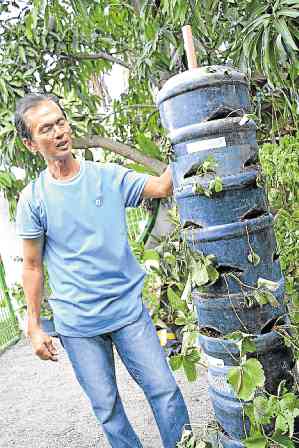Going gaga over organic food

ORGANIC farmer Boy Atog experiments with vertical structures to maximize space for planting. In this vertical container, he experiments with strawberries. GERMELINA LACORTE
A very small space needs a big mind,” said organic farmer Boy Atog, who keeps an organic farm in a crammed space at home in the middle of the city. “We have limited space at home, so what we did was broaden our mind to be able to use every inch of that small space to plant.”
So within his 180-square-meter lot in Barangay Angliongto, near Damosa in Lanang here, he used up 30 square meters for an organic farm, where he harvests an average of 25 kilograms of lettuce every month and sets aside samples for display at the city’s organic fair at Rizal Park every Friday.
“When our space is very limited, we keep thinking how to maximize every inch of it,” he said.
Using the principle of container gardening, he set up a cascading structure around an extra space in his front yard for his garden, and built it to maximize the use of water.
Every drop of water that travels down the structure drains into the rectangular pond at the bottom of the garden, where he grows tilapia, from which he draws water for his plants.
Article continues after this advertisement“Our idea of a farm used to be a very big place, but now it has changed,” said Atog, who grew up in Manay, Davao Oriental province, where farmers move from farm to farm every two years. “Now, we can make a garden wherever we are,” he said.
Article continues after this advertisement“Even if I live in a condominium, I’ll still put up a garden,” he said, with a determined look on his face.
“If I were in heaven, I would make a garden,” he said, laughing.
He has been experimenting with vertical structures to double and even triple the space to grow lettuce and, lately, strawberries.
Atog was introduced to organic farming in 2009, two years after he was elected village councilor. That year, village officials built a garden around the village hall in Angliongto, but their dependence on chemicals dismayed Atog.
“I hate the idea of buying chemicals to fertilize the plants,” he said. “I used to grow up in a place where nature used to take care of everything,” he added.
So he started segregating biodegradable waste and using it to fertilize plants. His efforts paid off. From 2010 to 2012, the village of Angliongto became a consistent winner of the Gulayan sa Barangay contests of the city agriculturist office.
Atog’s waste segregation efforts and the growing popularity of organic farming were credited for the victories.
Atog’s home garden also got noticed for organic farming.
Today, Atog uses all of his kitchen waste for compost. He feeds yellowing lettuce leaves to his chickens.
Atog has also wormed his way into vermiculture, discovering the pesticide qualities of vermi-tea and molasses.
He refuses to throw anything away so he prunes outgrown branches of a mango tree in his yard. Planted alongside his lettuce are insect-repelling herbs like peppermint, spearmint, basil and oregano.
Atog is among a growing number of people who, aware of the use of pesticides and the threat of genetically modified organisms invading the food industry, are turning to organically grown food.
Most flock to the weekly organic farm at Rizal Park every Friday, where the city government, prodded by the growing organic movement in the city, has allotted space for organic farmers to showcase their produce.
Ann Fuertes, executive director of the environment group Interface for Development Intervention, said her group had been lobbying for full implementation of the Organic Agriculture Ordinance in the city.
The local law provides for the setting up of a trading post for organic products. The Department of Agriculture has released P1 million for the project, but it has yet to open.
The organic movement is widespread, judging by the products showcased in the weekly fair.
Among those featured is a variety of organic rice called MagRice (Magsaysay Rice) produced by farmers in Magsaysay town in Davao del Sur province, at least 173 kilometers from Davao City. The rice is now in demand and is getting noticed in other areas.
Demand is increasing for MagRice, said Cristina Soria, manager of Magsaysay Organic Farmers Marketing Cooperative.
“We no longer have trouble marketing our product. We have trouble coping with demand,” she said.